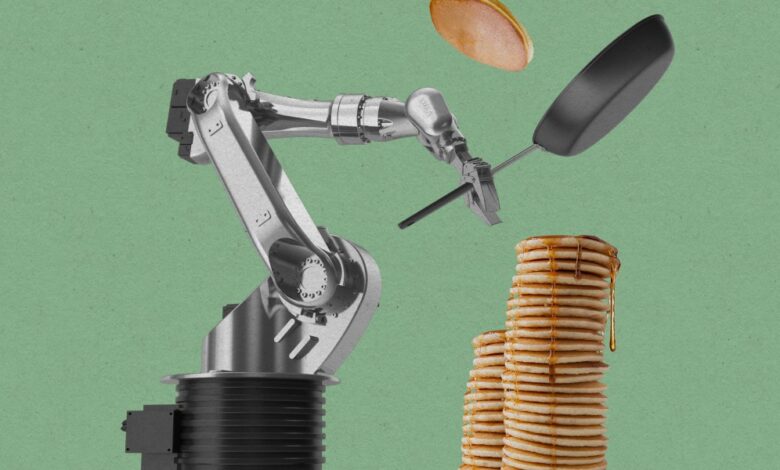The Download: robotics’ data bottleneck, and our AI afterlives

Plus: AI companies don’t even need a product to raise serious capital these days
This is today’s edition of The Download, our weekday newsletter that provides a daily dose of what’s going on in the world of technology.
The robot race is fueling a fight for training dataWe’re interacting with AI tools more directly—and regularly—than ever before. Interacting with robots, by way of contrast, is still a rarity for most. But experts say that’s on the cusp of changing.
Roboticists believe that, using new AI techniques, they can unlock more capable robots that can move freely through unfamiliar environments and tackle challenges they’ve never seen before.
But something is standing in the way: lack of access to the types of data used to train robots so they can interact with the physical world. It’s far harder to come by than the data used to train the most advanced AI models, and that scarcity is one of the main things currently holding progress in robotics back.
As a result, leading companies and labs are in fierce competition to find new and better ways to gather the data they need. It’s led them down strange paths, like using robotic arms to flip pancakes for hours on end. And they’re running into the same sorts of privacy, ethics, and copyright issues as their counterparts in the world of AI. Read the full story.
—James O’Donnell
My deepfake shows how valuable our data is in the age of AI
—Melissa Heikkilä
Deepfakes are getting good. Like, really good. Earlier this month I went to a studio in East London to get myself digitally cloned by the AI video startup Synthesia. They made a hyperrealistic deepfake that looked and sounded just like me, with realistic intonation. The end result was mind-blowing. It could easily fool someone who doesn’t know me well.
Synthesia has managed to create AI avatars that are remarkably humanlike after only one year of tinkering with the latest generation of generative AI. It’s equally exciting and daunting thinking about where this technology is going. But they raise a big question: What happens to our data once we submit it to AI companies? Read the full story.
This story is from The Algorithm, our weekly AI newsletter. Sign up to receive it in your inbox every Monday.
The must-reads
I’ve combed the internet to find you today’s most fun/important/scary/fascinating stories about technology.
1 AI startups without products can still raise millions
How some of them plan to make money is unclear, but that doesn’t deter investors. (WSJ $)+ Those large AI models are wildly expensive to run. (Bloomberg $)
+ AI hype is built on high test scores. Those tests are flawed. (MIT Technology Review)
2 The EU says Meta isn’t doing enough to counter Russian disinformation
So it’s launching formal proceedings against the company ahead of EU elections. (The Guardian)
+ Three technology trends shaping 2024’s elections. (MIT Technology Review)
3 Meet the humans fighting back against algorithmic curation
The solution could, ironically, lie with different kinds of algorithms. (Wired $)
4 An AI blood test claims to diagnose postpartum depression
It says the presence of a gene that links moods more closely to hormonal changes is an indicator. (WP $)
+ An AI system helped to save lives in a hospital trial. (New Scientist $)
5 Tesla secretly tested its autonomous driving tech in San Francisco
Which hints that its previous ‘general solutions’ approach fell short. (The Information $)
+ Robotaxis are here. It’s time to decide what to do about them. (MIT Technology Review)
6 Why egg freezing has failed to live up to its hype
We’re finally getting a clearer picture of how effective the procedure is. (Vox)
+ I took an international trip with my frozen eggs to learn about the fertility industry. (MIT Technology Review)
7 NASA has finally solved a long-standing solar mystery
The sun’s corona is far hotter than its surface. But why? (Quanta Magazine)
8 Do dating apps actually help you find your soulmate?
Chemistry and a great relationship are difficult to quantify. (The Guardian)
+ Here’s how the net’s newest matchmakers help you find love. (MIT Technology Review)
9 Online messaging has come a long way
BBS, anyone? (Ars Technica)
10 The three-year search for a synth-heavy pop song is over
…But its origins are seedier than you’d expect. (404 Media)
Quote of the day
“This is the Oppenheimer Moment of our generation.”
—Alexander Schallenberg, Austria’s foreign minister, warns against granting AI too much autonomy on the battlefield during a summit in Vienna, Bloomberg reports.
The big story
Next slide, please: A brief history of the corporate presentation
PowerPoint is everywhere. It’s used in religious sermons; by schoolchildren preparing book reports; at funerals and weddings. In 2010, Microsoft announced that PowerPoint was installed on more than a billion computers worldwide.
But before PowerPoint, 35-millimeter film slides were king. They were the only medium for the kinds of high-impact presentations given by CEOs and top brass at annual meetings for stockholders, employees, and salespeople.
Known in the business as “multi-image” shows, these presentations required a small army of producers, photographers, and live production staff to pull off. Read this story to delve into the fascinating, flashy history of corporate presentations.
—Claire L. Evans
We can still have nice things
A place for comfort, fun and distraction to brighten up your day. (Got any ideas? Drop me a line or tweet ’em at me.)
+ This is some seriously committed egg flipping. 🍳
+ How to spend time and make precious memories with the people you love.
+ Gen Z is on the move: to the US Midwest apparently.
+ Cool: these novels were all inspired by the authors’ day jobs.


